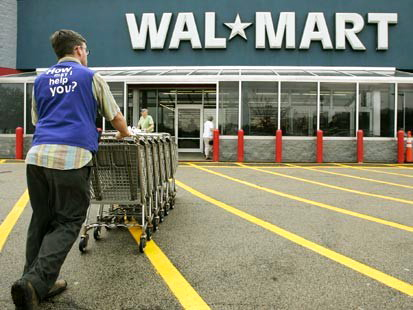Cross-posted on Huffington Post.
Two things seem particularly noteworthy about the approval Wal-Mart won yesterday to acquire Massmart, a Johannesburg-based chain that operates across 13 African countries.
One is that, despite the ample publicity Wal-Mart has engineered for its “buy local” efforts, the company in fact has zero interest in cultivating local suppliers beyond stocking a few token local veggies suitable for a nice photo-op.
And two: even in countries where the law clearly states that the public interest must be protected in large mergers, global trade agreements give corporations the upper hand, or at least give government authorities an excuse to ignore their own laws.
In issuing its approval yesterday, South Africa’s Competition Tribunal, a quasi-judicial body charged with protecting the public interest in large corporate mergers, imposed only minimal conditions on the deal, stating that stronger requirements to protect local suppliers and labor rights “could violate the country’s trade obligations.”
Wal-Mart first raised the specter of the World Trade Organization (WTO) during its closing arguments before the tribunal, which had just heard a week of testimony from unions, government officials, economists and others who built a compelling case that the merger should be subject to strict conditions or rejected altogether.
The strength of the opposition seemed to surprise Wal-Mart, which has not made a significant acquisition since it bought the British supermarket chain Asda in 1998.
South Africa’s robust trade unions, led by the Commercial, Catering and Allied Workers’ Union (CCAWU), which represents Massmart employees, had begun organizing to block the merger last fall, issuing a list of demands shortly after the deal became public.
The government departments of trade, agriculture and economic development also came out against the deal.
One of the pivotal issues concerned sourcing. Massmart currently buys 60 percent of its goods from South African manufacturers and farmers. Wal-Mart would supplant these networks of local production and trade with its own global supply chain, sending a flood of imported food and other goods into a country that already has 25 percent unemployment. A government-commissioned analysis concluded that every 1 percent shift from domestic to overseas suppliers by Massmart would cost the country 4,000 jobs.
Momentum began to build in favor of imposing a local procurement quota as a condition of the merger. But local sourcing is untenable to Wal-Mart. Although the company has orchestrated heaps of positive media by stocking a few items of local produce in its U.S. stores, what makes Wal-Mart Wal-Mart is its global supply chain. The company is not so much a retailer as a distributor. Its market power comes from its ability to acquire goods in one location and distribute them across the planet with a remarkable degree of precision and efficiency. If buying locally from South African producers became a condition of the merger, Wal-Mart would have to drop the deal.
Worried about losing Massmart and, with it, a launching pad for all of Africa, Wal-Mart in its closing arguments raised the threat of a WTO action if the Competition Tribunal pursued the sourcing condition. Although the question of global trade agreements had not surfaced in the debate before, it became a central theme of the media coverage during the tribunal’s final two weeks of deliberation.
Wal-Mart also offered a list of merger conditions that it told the tribunal it would be glad to comply with, including putting about $14 million into a “suppler development fund” to help South African producers learn how to become Wal-Mart suppliers. (The company is spending $2.4 billion to buy Massmart, which does about $7 billion in sales each year.)
The Competition Tribunal adopted Wal-Mart’s minimal conditions as its own and approved the deal with no other stipulations.
International expansion is critical for Wal-Mart, which has seen same-store sales in the U.S. decline for eight consecutive quarters. But while it has established a foothold in South America, Asia, Europe, and now Africa, Wal-Mart’s global ambitions have often fallen short of expectations. It pulled out of Germany and South Korea after losing billions of dollars. Its growth in China has been relatively weak given the size of the country, and Asda has yet to challenge Tesco’s dominance of the UK market.
South Africa’s tough and politically influential trade unions promise anything but smooth sailing for Wal-Mart’s entry into Africa. CCAWU says leaders will be meeting later this month to chart their next move, which could include disruptive protests, strikes and “the mother of all boycotts.”




